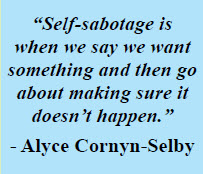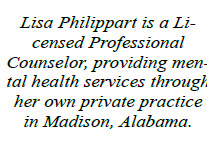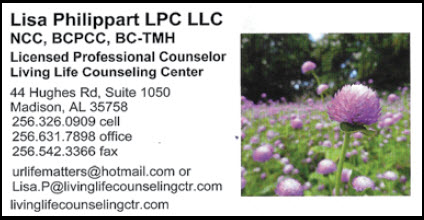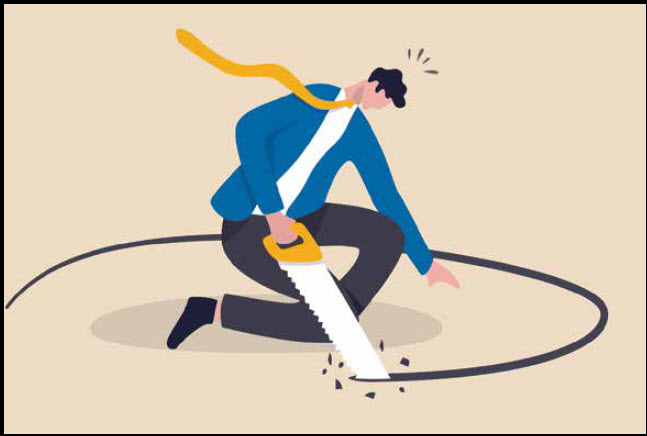 By: Lisa Philippart
By: Lisa Philippart
Few things are as painful and frustrating as getting caught in a cycle of self-sabotage. For example, maybe you tend to sabotage your relationships because of fear of intimacy or emotional vulnerability. Or maybe you sabotage your creative pursuits with procrastination. Whatever your struggle, self-sabotage is the result of an unhealthy relationship with your emotions. We all experience painful emotions but may get into the bad habit of trying to either fix or avoid the difficult feelings as soon as they arise. By constantly running away from uncomfortable feelings, you have taught your brain that it’s not okay to have those feelings. This leads to a vicious cycle of feeling bad about feeling bad! Let’s discover some ways to build a healthier relationship with your emotions.
Often, self-sabotage was started with an automatic behavior. (I don’t like the word trigger, so I’ll use prompt instead.) If you can learn to identify and anticipate your self-sabotaging prompts, you can often become more aware of the self-sabotaging patterns or behaviors. A prompt can be internal (a thought or emotion) or external (someone else’s behavior). Here are some examples: Your prompt for stress-eating may be the anxiety (emotion) you feel during a meeting. Your prompt for pulling back from a relationship might be your partner’s suggestion to spend more time with family (behavior). Awareness of the initial prompts is one of the best ways to interrupt the whole process.
 Another way to stop the self-sabotage is to practice validating painful emotions. Our default reaction is to avoid them, but while this may lead to feeling better in the short term, it’s usually at the expense of your long-term goals and values. But the critical thing to see here is that the whole process begins with the following assumption: If I feel bad, I have to do something about it. Here’s the weird thing about emotional pain…it can’t hurt you. Shame or anger will not cause your body to break down and stop functioning. Of course, how you respond to those feelings might be dangerous, but the feelings themselves are not. Emotional validation means acknowledging your emotions instead of avoiding them, critiquing them, or trying to get rid of them. It is doing something for yourself as you would do for someone else who was struggling with a difficult feeling. You would be compassionate, supportive, and empathetic. It’s just a matter of taking a few seconds to extend the same kindness to yourself.
Another way to stop the self-sabotage is to practice validating painful emotions. Our default reaction is to avoid them, but while this may lead to feeling better in the short term, it’s usually at the expense of your long-term goals and values. But the critical thing to see here is that the whole process begins with the following assumption: If I feel bad, I have to do something about it. Here’s the weird thing about emotional pain…it can’t hurt you. Shame or anger will not cause your body to break down and stop functioning. Of course, how you respond to those feelings might be dangerous, but the feelings themselves are not. Emotional validation means acknowledging your emotions instead of avoiding them, critiquing them, or trying to get rid of them. It is doing something for yourself as you would do for someone else who was struggling with a difficult feeling. You would be compassionate, supportive, and empathetic. It’s just a matter of taking a few seconds to extend the same kindness to yourself.
I believe that how we think determines how we feel determines how we act. So, if you can take responsibility for your mind/ thoughts you can take control of your emotions. In other words, it’s not what happens to us that causes us to feel bad…it’s how we think about what happens that causes us to feel the way we do. Now to be clear, you can’t control everything about your mind. For example, your boss says something critical, so you begin to worry. Sometimes thoughts pop into our mind. But you can control whether you continue to think about and worry on that criticism. So, if you want to control how emotional you feel (and as a result, whether you follow through on your goals or self-sabotage) the key is to focus your energies on what you can control. Things you can’t control: other people and random thoughts that pop into mind. Things you can control: your behavior and your attention.
Finally, the real problem of self-sabotage is that you aren’t living the life you really want! It may be time to take assertive action on your values. Assertiveness means that you base your decisions on your values, not your feelings. I realize that this isn’t easy, and part of the reason is because we often feel powerless in the face of strong emotions. Making time to clarify your values will motivate you to follow through on them. But if you ignore them because you are overly focused on how you feel (or want to feel) you’re likely going to end up falling short of those values and falling into self-sabotage. I’m not saying you should completely ignore how you feel. I believe that you’ll end up feeling a lot better if you stop using feelings to make decisions and use your values instead.
By: Lisa Philippart
Licensed Professional Counselor







